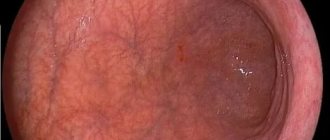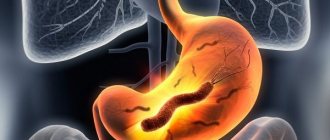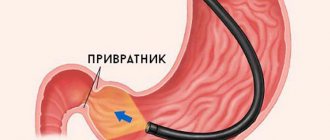Chronic gastritis - symptoms and treatment
Currently there is no generally accepted classification of the disease. In clinical practice in the Russian Federation, the working classification created on the basis of the classification of S.M. is most often used. Ryss and the Houston modification of the Sydney HG classification. It is compiled with the inclusion of clinical and functional sections, with their designation (in the spirit of the Sydney system) by the grammatical terms “inflection” (ending). The group of hCG type C also includes medicinal and professional forms of hCG.[7]
Working classification of CG
By etiology and pathogenesis (prefix):
- CG type A: autoimmune fundic atrophic, including those associated with megaloblastic Addison-Birmer anemia;
- CG type B: bacterial antral nonatrophic, associated with HP infection;
- CG type AB: combined atrophic pangastritis (with damage to all parts of the stomach).
According to topographic and morphological features (root or core):
- by localization:
- fundic hCG (type A);
- antral hCG (type B);
- pangastritis (type AB) with predominant damage to the antrum or fundus;
- according to morphological criteria:
- superficial CG;
- interstitial hCG;
- atrophic CG with mild, moderate or severe atrophy;
- CG with intestinal metaplasia (complete or incomplete, small intestinal or colonic).
According to specific morphological characteristics (suffix):
- according to the severity of the inflammatory process in the gastric mucosa:
- minimum;
- minor;
- moderate;
- pronounced (depending on the degree of lymphoplasmacytic inflammatory infiltration of the gastric mucosa);
- according to hCG activity:
- no activity;
- light (I);
- medium (II);
- ▪ high (III) (depends on the presence and severity of the neutrophilic - granulocytic component in the inflammatory infiltration of the gastric mucosa);
- according to the presence and severity of contamination of the coolant with HP infection:
- absent;
- light (I);
- medium (II);
- high (III);
According to clinical features:
- CG (type B) with a predominance of pain syndrome (Gastritis dolorosa);
- CG (type A) with a predominance of dyspeptic symptoms;
- CG with a latent (asymptomatic) course (~50%).
According to functional criteria (flexion), the following forms of chronic gastritis :
- HCG with preserved (and increased) secretion;
- CG with secretory insufficiency (moderate, severe, total).
Endoscopic criteria for hCG:
- erythematous (exudative) superficial CG;
- CG with flat (sharp) erosions;
- CG with rising (chronic) erosions;
- hemorrhagic hCG;
- hyperplastic hCG;
- HCG complicated by GDR (reflux gastritis).
When formulating a diagnosis, the following algorithm is used: Prefix (etiology) - Root (localization) - Suffix (morphology) - Inflection (function) with the addition of endoscopic criteria.
Example of diagnosis: Chronic Helicobacter gastritis of the antrum of the stomach with moderate inflammation, moderate activity, high contamination with Helicobacter pylorus with preserved secretion.
Due to the greater availability of morphological assessment of the condition of the gastric mucosa based on the results of studies of biopsy material, the CG classification according to the OLGA (Operative Link for Gastritis Assessment) system is increasingly being used. Over time, the morphological classification of CG will become the leading one in the world.
CG, like all chronic diseases, has two stages: exacerbations and remissions, which successively replace each other. With each exacerbation, greater structural changes occur in the mucosa. Exacerbation and remission of hCG can be confirmed clinically or endoscopically (the most accurate confirmation is based on the results of endoscopy and the morphology of the biopsy material).
Based on the cause of occurrence, the following types of chronic gastritis : caused by Helicobacter Pylori infection, drug-induced and autoimmune atrophic gastritis.
Caused by Helicobacter Pylori infection (HP infection)
Currently, HP infection (type B gastritis) plays a leading role in the development of CG. The majority of adults over 60 years of age are infected with this bacterium. In Russia, among children over 5 years old, 30% are infected, at the age of 15-20 years - 63%, adults - more than 85% [10]. The pathogenesis of the effect of this pathogen on the stomach is that chronic Helicobacter Pylori infection causes changes in the tissues of the gastric mucosa. For a long time, the infection occurs without symptoms. As inflammation spreads to the body of the stomach and the response of the mucous membrane increases, the first symptoms of gastritis appear. The longer the infection lasts, the stronger the restructuring of the mucous membrane. This restructuring of the mucosa consistently leads to atrophy, intestinal metaplasia and dysplasia, leading to gastric cancer. The development of gastric atrophy is a critical step in the transition of hCG to gastric cancer.
Drug-induced gastritis (type C)
This is the second most common form of gastritis. The effect on the stomach of non-steroidal anti-inflammatory drugs (NSAIDs) has been most studied. They do not cause direct aggressive action, like acids (hydrochloric acid is tens of times more aggressive). The pathogenesis of their effect on the gastric mucosa is based on the blocking of cyclooxygenase enzymes (isomers COX-1 and COX-2). When COX-1 is blocked, the synthesis of prostaglandins (E2 and I2) is suppressed, which ensure the quality and strength of the mucosal barrier that protects the mucous membrane from the aggressive effects of hydrochloric acid and pepsin. Therefore, long-term use of NSAIDs leads to a thinning of the protective layer of mucus and an increase in the aggressive effect of hydrochloric acid on the gastric mucosa, causing chronic inflammation.
Autoimmune atrophic gastritis (type A gastritis)
The rarest form of hCG is autoimmune atrophic gastritis (type A gastritis). Until now, its etiology is not known. It is based on the production of antibodies by immune cells to the parietal cells of the mucous membrane (synthesize hydrochloric acid) and the internal factor of Castle (participates in the absorption of iron in the intestine). As a result of this, inflammatory changes develop, very early leading to atrophy and achlorhydria (a condition in which there is no hydrochloric acid in the gastric juice). The metabolism of vitamin B12 is also disrupted, aggravating the course of anemia.
In addition to those listed, there is a group of specific types of chronic gastritis.
Radiation gastritis - the causative factor is ionizing radiation, which has both a direct damaging effect on the mucous membrane and through a cascade of reactions with the formation of free radicals and lipid peroxidation of cell membranes. As a result, with prolonged exposure to doses of ionizing radiation exceeding the maximum threshold, chronic radiation gastritis develops.
Lymphocytic gastritis is characterized by specific inflammation in the gastric mucosa, which develops against the background of gluten enteropathy - celiac disease (a pathological disorder of the intestines in which gluten intolerance occurs). The mucous membrane is damaged by its own antibodies with the development of chronic inflammation.
Granulomatous gastritis develops as a result of the involvement of the stomach in the inflammatory process in Crohn's disease (chronic inflammatory bowel disease) and occurs with similar mucosal lesions in the form of erosions and ulcers. Specific foci of chronic inflammation, granulomas, form in the mucosa.
Eosinophilic chronic gastritis develops with food allergies. If you do not follow a diet that excludes the allergen, chronic inflammation develops in the gastric mucosa. The more often allergens enter the stomach, the more pronounced the manifestations of gastritis.
The course of chronic gastritis
CG is a long-term disease: on average, 18-25 years pass before the development of pronounced structural changes in the gastric mucosa in the form of atrophy, dystrophy or dysplasia. Over time, each exacerbation leads to the spread of the inflammatory process not only over the area (breadth), but also into the depth of the mucous membrane. When the body and fundus of the stomach are involved in the process, the production of hydrochloric acid and pepsin begins to decrease, which leads to digestive disorders.
Causes of acute gastritis
- Excessive alcohol intake;
- Consumption (accidentally or intentionally) of acids, alkalis and other toxic substances;
- The use of certain medications, in particular large doses of so-called non-steroidal anti-inflammatory drugs (for example, aspirin);
- Complication of serious diseases (for example, myocardial infarction, stroke, liver or kidney failure), injuries, burns, operations, life-threatening conditions - the so-called acute stress gastritis;
- Some infections (cytomegalovirus (especially in patients with HIV infection), severe staphylococcal infection, etc.);
- Severe radiation damage;
- In rare cases, acute gastritis is associated with infection with the bacterium Helicobacter pylori (Helicobacter)
Treatment of pathology
Famotidine effectively reduces the production of hydrochloric acid and protects the inner lining of the organ from its effects.
Therapy for gastritis with high acidity of gastric juice should be aimed at eliminating excessive secretion, as the main irritating factor for the mucous membrane. This is achieved by taking antacid drugs Almagel, Phosphalugel or Rennie. Proton pump inhibitors are also used, which reduce the amount of gastric juice secreted. Omez and Omeprazole are widely used. H-cholinoreceptor blockers will be effective, as they eliminate the aggressive effect on the mucous membrane. These include Ranitidine or Famotidine. If the patient is diagnosed with Helicobacter pylori bacteria, antibiotics are prescribed.
Treatment of chronic gastritis with increased or preserved secretion is impossible without following a diet and nutrition regimen. Patients are advised to eat fractionally, breaking meals into many small portions. This will help not to burden the stomach and avoid the development of feelings of hunger, because it is this that provokes an increase in stomach acidity. Preference should be given to liquid boiled food, as well as steamed food. Milk and fermented milk products will be beneficial. Fried, fatty and spicy foods are prohibited, as well as food that can cause mechanical injury to the mucous membrane.
Drug therapy for exacerbation of gastritis
The gastroenterologist individually draws up a drug therapy regimen, taking into account the results of the examination: the level of acidity, the degree of damage to the mucosa and the causes of exacerbation.
Antibiotic therapy
Antibiotic therapy is prescribed if the exacerbation of gastritis is provoked by the activation of Helicobacter pylori infection. The doctor may prescribe a combination of Clarithromycin with Amoxicillin, Metronidazole with Tetracycline, or other combinations of drugs.
If necessary, antibiotics are supplemented with antisecretory agents. They use Rabprazole , Gastrofarm , Omeprazole , Ranitidine , Cytotec , and other medications of this group.
Normalization of acidity
If a person has a low level of acidity, then at the 2nd stage of treatment of exacerbation of gastritis, medications are used that stimulate the secretion of the organ. They use gastric juice, Acidin-pepsin , Pancreatin , Panzinorm , Mezim and other enzyme agents.
To relieve inflammation, it is useful to take Plantaglucid. For increased acidity, Maalox , Gastal , Phosphalugel or other anacidic drugs are prescribed. They have an enveloping property, suppress heartburn and prevent the formation of erosions.
Other medications for exacerbation of gastritis
With relapses, signs of mucosal inflammation appear more sharply, so doctors use symptomatic therapy medications. No-shpu , Baralgin , Papaverine or other antispasmodics are used as painkillers Vomiting or nausea is eliminated with the drug Reglan , Cerucal . If there is heaviness in the stomach and poor gastrointestinal motility, the patient is prescribed Motilak or another prokinetic agent. If stool disorder is caused by dysbiosis and the action of antibiotics, it is useful to take Subalin , Bifiform , and other pre─ or probiotics.
For exacerbations, the combination drug De-Nol . It has antibacterial, astringent, antiulcer, anti-inflammatory and film-forming (gastroprotective) effects.
Dangerous complications of gastritis
Gastritis in itself is not very scary, but its possible consequences are scary.
This means:
- peptic ulcer;
- pancreatitis affecting the pancreas;
- malignant cancer tumor;
- internal bleeding;
- B12 deficiency anemia, etc.
Some of the listed diseases, developing due to initially superficial inflammation, can lead to severe disturbances in the functioning of the body, including death.
Stomach ulcer disease
An ulcer is a pathological process caused by deep damage to the wall of the stomach or duodenum. The disease is manifested not only by disturbances in the functioning of the digestive organs; other organ systems also react to its exacerbations. This disease affects up to ten percent of all adult residents of Russia.
An ulcer is a pathological process caused by deep damage to the wall of the stomach or duodenum.
With a severe ulcer, the exacerbation lasts for two weeks and sometimes causes very serious inconvenience, including sometimes causing stomach bleeding. You should also be wary of perforation of the inflamed area - the formation of a through hole through which the contents of the stomach risk entering the abdominal cavity. If medical assistance is not provided in time during a perforation, the victim is at risk of peritonitis and then death.
Pancreatitis
Pancreatitis is an inflammatory-dystrophic disease of the pancreas. As a rule, it initially manifests itself in an acute form and then gradually progresses. If the pathological process is not detected in time, very, very serious complications are possible, including the development of diabetes mellitus and hepatitis.
Advanced chronic pancreatitis is attached to a person for life. By diligently following the doctor’s recommendations, the patient can completely protect himself from possible exacerbations.
You will need to adhere to some dietary restrictions - in particular, give up hard-to-digest foods and any alcoholic beverages. You will also need to take certain medications constantly or periodically.
Stomach cancer
Cancer is a truly scary diagnosis. If you have only atrophic gastritis or an ulcer so far, do everything possible to avoid the worst. When malignant damage affects the submucosal layers of the inner lining of the stomach, reversing the process becomes much more difficult.
The main problems begin if the cancer metastasizes to other organs - liver, pancreas, etc.
The main problems begin if the cancer metastasizes to other organs - the liver, pancreas, etc. Then the operation provides only a temporary effect. In the later stages, radiation therapy and medications that prevent the division of dangerous cells are used. In the terminal stage, the essence of treatment comes down to powerful pain relief.
Gastrointestinal bleeding
If you suspect moderate bleeding, closely monitor your health and, if possible, quickly see a gastroenterologist. If you notice increasing weakness, call a doctor. Then lie down in bed and wait for a specialist to arrive - a competent ambulance worker should recognize the bleeding based on the results of the examination and ensure that you are hospitalized.
Bleeding in the organs of the digestive system often results from taking medications. The gastrointestinal tract is very sensitive to NSAIDs (diclofenac, metamizole), anticoagulants (warfarin, phenindione), antiplatelet agents (acetylsalicylic acid).
Sources:
- https://www.kp.ru/guide/gastrit.html
- https://studfiles.net/preview/1564106/page:4/
- https://diseases.medelement.com/disease/
- https://medaboutme.ru/zdorove/publikacii/stati/sovety_vracha/gastrit_pochemu_nelzya_zapuskat_bolezn/
- https://gastritinform.ru/pallcare.ru/
- https://zhkt.ru/zheludok/gastrit/anacidnyj.html
- https://medbrat.online/zheludok/gastrit/oslozhneniya-ostrogo-i-hronicheskogo-gastrita.html
- https://gastritinform.ru/gastrit-yazva.ru/zabolevania/oslozhneniya/











